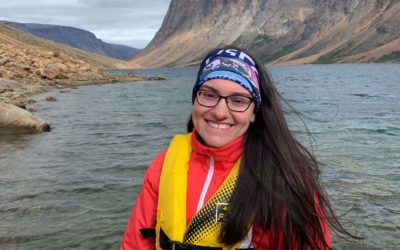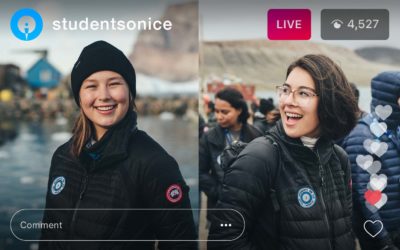Roslyn Bern, President of the Leacross Foundation, sat down with three young women who are studying and working in STEM fields. They discuss their secrets to success, where they hope to go and barriers to women succeeding in their fields. Watch now to hear more from Michaela Hammond, biomedical engineering student, Hannah Weider who is studying computer science and Cassandra Elphinstone who is a graduate student studying Arctic plant genomics.
This interview is made possible with support from the Natural Sciences and Engineering Research Council of Canada.
Roslyn Bern

Roslyn Bern, President of the Leacross Foundation focuses on supporting young women and girls in their pursuits to be challenged, to create new ways of interacting in the environment, and to speak out for gender equity. As a former teacher, Roslyn believes in education to further the lives of women and girls, and does site visits on the unusual side, from visiting her scholarship recipients in the Arctic, or participating in conferences abroad to support tradeswomen. She feels that the STEM fields are economically empowering for women, and strives to get her biomedical engineers into the operating rooms to watch and learn about heart transplants. As a former outdoor enthusiast who has run white water rivers with students, she has also assisted teams building homes with Habitat for Humanity. Heading the Leacross Foundation, she tries to examine and remove the barriers that keep women and girls from achieving their dreams.
Michaela Hammond

Michaela is a second-year biochemical engineering student at Queen’s University and is passionate about environmental sustainability and innovation. Michaela enjoys an active lifestyle and volunteers with a variety of outdoor and youth-outreach clubs on campus and in her home community of Halifax, NS. In addition to her goals to advance the field of “green” engineering and sustainable energy sources, Michaela hopes to one day thru-hike the Appalachian or Pacific Crest Trail. Michaela is a Leacross alumni of the 2018 Arctic Expedition.
Cassandra Elphinstone

Cassandra Elphinstone was first introduced to the Arctic on an SOI expedition in 2011 funded by the Leacross Foundation. The trip truly changed her life, drawing her back to the Arctic nearly every summer since. Currently, Cassandra is a graduate student in the UBC Department of Botany studying Arctic plant genomics. She has spent six summers working in Alexandra Fiord on Ellesmere Island (79 degrees north) studying the effects of warming on tundra plant species. Her PhD thesis explores the genomic DNA methylation of Dryas integrifolia (White Mountain Avens) plants from artificially warmed and controlled plots at four sites around the Arctic. She is working to determine if there are DNA sequence or methylation patterns that are consistently associated with artificial warming. When not working on her thesis, she enjoys hiking, back-country skiing, mountaineering, and working on alpine huts and trails. As a member and current president of the UBC Varsity Outdoor Club (https://www.ubc-voc.com/), Cassandra enjoys teaching people to backcountry ski and introducing students to glacier travel and basic mountaineering. Currently, she is also the student representative for the International Tundra Experiment (https://www.gvsu.edu/itex/).
Hannah Weider

Hannah is a computer science student studying in her second year at Queen’s University in Kingston, Ontario. She is passionate about encouraging girls to code and enter the world of tech. In high school, she started a course for young girls that taught them the basics of coding and web design. At Queen’s, she is a member of the Women in Computing organization where she helps to create a sense of community for women in computer science. Thanks to the Leacross Foundation, Hannah participated in the Students on Ice Expedition in 2018 which continues to inspire her dream to create positive change through technology.
DISCOVER MORE
“To me, Arctic policy is a way to build a better future for the North”
Veronica Flowers, Arctic 2017 alum from Hopedale, Nunatsiavut, shares her reflections on gaps she sees in her community when it comes to policy,...
Re-imagining a Resilient and Sustainable Blue Economy within the Circumpolar Arctic
Listen to this panel with representatives from five Nordic countries discussing what a Sustainable Blue Economy (SBE) could look like within the...
Join the conversation! Nuiana and Heidi want to hear your thoughts on youth engagement in policy
Nuiana Hardenberg recently participated in the Arctic Youth panel at the 2021 EU Arctic Forum and Indigenous Peoples’ dialogue. She will be joined...




